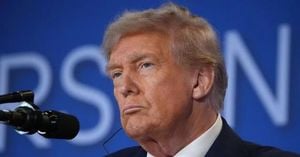On August 16, 2025, Nigeria’s national security adviser announced a breakthrough that many in the country’s security apparatus had been awaiting for years: the arrest of two of the nation’s most wanted militant leaders. The operation, which spanned several months and involved multiple security agencies, culminated in the capture of Mahmud Muhammad Usman, alleged head of Ansaru—an al-Qaida-linked group—and Mahmud al-Nigeri, the leader of the newer and increasingly notorious Mahmuda group. The news, delivered at a press conference in Lagos, was met with a mixture of relief, hope, and cautious optimism by officials and citizens alike.
According to the Associated Press, the two men had long been at the top of Nigeria’s most wanted list, accused of masterminding attacks that have shaken the country’s sense of security and stability. Ansaru, which splintered from Boko Haram, has been a persistent threat for years, while Mahmuda only recently emerged into national consciousness after a string of violent attacks earlier this year in Nigeria’s north-central region. The groups’ activities, though distinct, have both contributed to a climate of fear and instability in the region.
Officials say the arrests took place during a coordinated operation conducted between May and July 2025. Security forces recovered valuable materials, including digital evidence now undergoing forensic analysis—a process that, authorities hope, will yield further leads and possibly result in additional arrests. The operation, as described by Nigeria’s national security adviser Nuhu Ribadu, was not only a tactical success but also a symbolic one. "These two men have been on Nigeria’s most-wanted list for years. They jointly spearheaded multiple attacks on civilians, security forces and critical infrastructure," Ribadu stated at the press conference, emphasizing the significance of the capture.
The evidence against the two is substantial. According to Ribadu, both Usman and al-Nigeri are believed responsible for the 2022 attack on Kuje prison, which led to the escape of dozens of jailed Boko Haram members—a debacle that highlighted the vulnerabilities in Nigeria’s correctional system and intensified public calls for reform. The duo is also accused of orchestrating the 2013 attack on the Niger uranium facility, a brazen act that alarmed both national and international observers concerned about the security of critical infrastructure in West Africa.
But the reach of these leaders, authorities say, extends far beyond Nigeria’s borders. Ribadu explained that the men maintain "active links with terrorist groups across the Maghreb, particularly in Mali, Niger and Burkina Faso." This transnational dimension has complicated efforts to combat their operations, as alliances with other militant organizations have allowed them to evade capture and coordinate attacks with greater sophistication.
The arrest comes at a time when Nigeria faces what many analysts describe as a complex, multidimensional security crisis. The country’s northern region has long been a hotbed for armed groups, with religiously motivated organizations like Boko Haram and its offshoots—including Ansaru and the Islamic State West Africa Province—operating alongside more amorphous bandit groups specializing in kidnapping for ransom and looting. Sometimes, the lines between these groups blur, with overlapping activities and shifting allegiances making the security landscape even harder to navigate.
Despite repeated military offensives, these groups have proven resilient. In fact, Boko Haram itself has mounted a major resurgence in 2025, underscoring the ongoing threat posed by militant organizations. The persistent violence has prompted international concern and support. On August 13, 2025, the U.S. government approved the sale of $346 million in arms to Nigeria, aiming to bolster the country’s fight against insurgency and criminal groups. The move was widely reported by outlets such as AP and underscores the global stakes involved in Nigeria’s security challenges.
The significance of the arrests has not been lost on experts. Oluwole Ojewale, a security analyst based in Dakar at the Institute of Security Studies, told reporters that the capture of the two leaders is likely to test the resilience of Ansaru and its ability to regroup or launch retaliatory attacks. "The impacts of this arrest on the terrorist groups depend on what the Nigerian state security does with the intelligence at their disposal," Ojewale observed. His comments reflect a broader sentiment among analysts: while the arrests are a blow to the militant groups, their long-term impact will hinge on how effectively Nigerian authorities use the information obtained from the operation.
Ribadu was unequivocal in his assessment of the operation’s importance. "The successful decapitation of the leadership of this dangerous franchise marks the most decisive blow against ANSARU since its inception. This strike has effectively dismantled its central command while paving the path for the complete annihilation of the group," he declared. It’s a bold statement, but one that is supported by the scale of the operation and the stature of the individuals apprehended.
Yet, the road ahead remains challenging. Nigeria’s security forces must now contend with the possibility of retaliatory attacks, not only from remnants of Ansaru and Mahmuda but also from allied groups across the region. The digital evidence recovered during the operation could prove invaluable, offering insights into the networks, funding sources, and future plans of these organizations. Forensic analysis is ongoing, and officials have hinted that further arrests could follow as investigators sift through the trove of materials.
For many Nigerians, the arrests offer a rare moment of hope in a landscape often dominated by grim headlines. The north-central region, where Mahmuda’s group gained notoriety earlier this year, has been particularly hard-hit by violence. Residents there have watched as attacks on villages, security outposts, and infrastructure have become almost routine. The news that two of the masterminds behind such violence are now in custody has brought a measure of relief, though it is tempered by the knowledge that the broader conflict is far from over.
International observers are watching closely. The involvement of groups like Ansaru, with its ties to al-Qaida, and the emergence of new players like Mahmuda, highlight the evolving nature of militancy in West Africa. The region’s porous borders, weak state institutions, and economic challenges provide fertile ground for armed groups seeking to expand their influence.
As Nigeria’s security agencies continue their investigation, the country stands at a crossroads. The arrests of Mahmud Muhammad Usman and Mahmud al-Nigeri represent a significant tactical victory, but the ultimate test will be whether authorities can capitalize on this momentum to disrupt militant networks and address the underlying factors fueling extremism. For now, Nigerians—and the world—watch and wait, hopeful that this decisive blow marks the beginning of a more secure future.




